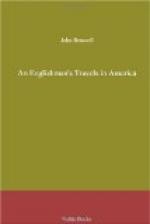A partiality exists in every part of America for music; indeed, so strongly is this developed, that in almost all the towns, and even in some hamlets in the western states, subscription bands are kept up—these play every evening, when the weather admits, in the centre of the public square, the citizens the while promenading round with their wives and families.
But, although a decided penchant prevails for music, the preference is given by the mass to a few ordinary airs, calculated to inspire that love of country which every reminiscence of the struggle for independence calls forth. The favourite air is the so-called national one of “Hail, Columbia,” although this is but second to the fantastic drollery of “Yankee Doodle;” the latter is vociferously called for at all places of amusement, and excites in the audience, at such places of resort, almost frantic sensations. This is the more remarkable, as it was originally composed by an Englishman, and, as it is so intimately connected with Americanism, I shall, perhaps, be excused for introducing here what may be termed its history.
In the attacks made upon the French posts in America, in 1755, those against Niagara and Frontenac were made by Governor Shirley, of Massachusetts, and General Jackson, of New York. Their army during the summer lay on the eastern bank of the Hudson, a little south of Albany. Early in June, the troops of the eastern provinces began to pour in company after company, and such an assemblage never before thronged together on such an occasion. “It would have relaxed the gravity of an anchorite,” says the historian, “to see the descendants of the Puritans marching through the streets of the ancient city, and taking their stations on the left of the British army—some with long coats, and others with no coats at all, and with colours as various as the rainbow; some with their hair cropped like the army of Cromwell, and others with wigs, the locks of which floated with grace round their shoulders. Their march, their accoutrements, and the whole arrangement of the troops, furnished matter of amusement to the British army. The music played the airs of two centuries ago; and the tout ensemble, upon the whole, exhibited a sight to the wondering strangers to which they had been unaccustomed.”
Among the club of wits that belonged to the British army, there was a Doctor Shackburg attached to the staff, who combined with his knowledge of surgery the skill and talent of a musician. To please the new-comers, he composed a tune, and, with much gravity, recommended it to the officers as one of the most celebrated airs of martial music. The joke took, to the no small amusement of the British. Brother Jonathan exclaimed, it was “nation fine;” and in a few days, nothing was heard in the provincial camp but the air of “Yankee Doodle.”
Little did the author, in his composition, then suppose, that an air, made for the purpose of levity and ridicule, should be marked for such high destinies. In twenty years from that time, the national march—now universally recognized by the patriots—inspired the heroes of Bunker’s Hill; and, in less than thirty, Lord Cornwallis and his army marched into the American lines to the tune of “Yankee Doodle.”




